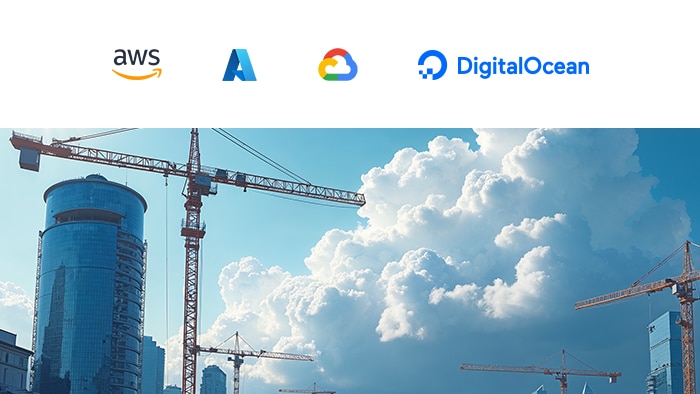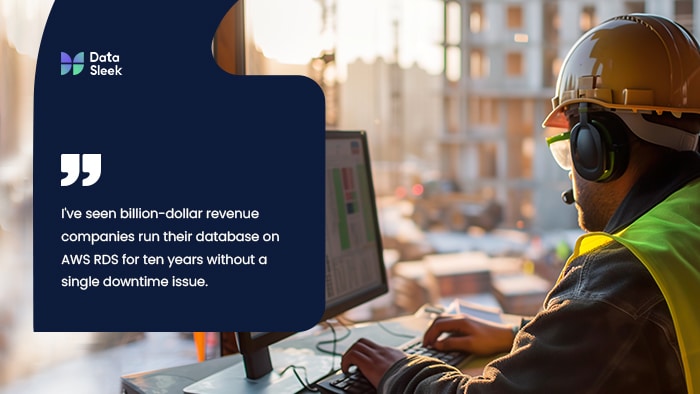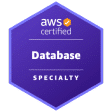
Key Highlights
- The construction industry is rapidly adopting cloud-based database solutions for improved efficiency and security.
- Selecting the right cloud provider and database design is crucial for stable and scalable construction applications.
- AWS, Azure, Google Cloud, and Digital Ocean offer various database solutions with different pricing and performance characteristics.
- Essential factors to consider when choosing a provider include database performance needs, scalability requirements, migration complexity, and overall cost.
- Implementing robust security measures and complying with industry regulations is vital for protecting sensitive construction data.
Introduction
The construction industry was one of the last adaptors to adopt technology. In today’s world, using technology is essential for a competitive edge. By offering scalable, secure, and efficient data management solutions, cloud databases empower businesses to streamline operations, enhance collaboration, and make more informed decisions. Selecting the right cloud database is not just about choosing a service—it’s about building a robust foundation that supports growth, efficiency, and adaptability.
Understanding the landscape of cloud databases, such as SQL Server and other options from major cloud providers like AWS, Azure, Google Cloud, and Digital Ocean, is critical. Each of these platforms offers unique capabilities tailored to different needs. By carefully aligning their data strategy with the right cloud solutions, construction companies can unlock powerful opportunities for improved data management and overall project success.

Understanding the Basics of Database Solutions for Construction
Construction applications need databases to handle diverse information. This includes project plans, material costs, contractor info, schedules, and real-time progress tracking. Traditional databases located on-site often struggle to keep up with industry changes.
Cloud-based databases fix these problems. They provide scalability, meaning they can grow with the company, and flexibility and save money. When construction companies move to the cloud, they get better access to data, make teamwork more accessible, and cut down on IT costs. Transitioning to the cloud provides construction companies with improved data accessibility, enhanced collaboration, reduced IT expenses, and smarter decision-making capabilities that drive better project outcomes.
The Importance of Stability, Scale, and Security
When choosing a database for your construction apps, it’s important to focus on stability, scalability, and security. High availability means your data is always easy to access, which helps reduce downtime and keeps your projects running smoothly. Scalability refers to how well the system can handle more data and users. This is especially important for dealing with complex construction projects.
Security is essential when dealing with sensitive construction data that must comply with strict regulatory requirements. Good security measures include data encryption, access control, and regular backups to keep your information safe. When choosing a reputable cloud provider, look for ones with a strong reputation in these areas to ensure your construction applications’ long-term success and reliability.
Overview of Database Servers and Cloud Providers
Navigating cloud databases begins with knowing the leading cloud providers and what they offer. Providers like AWS, Azure, Google Cloud, and Digital Ocean offer different database services to meet various needs. These platforms handle tasks like server setup, maintenance, and backups, allowing your team to focus on important business goals.
Selecting the right cloud provider significantly impacts application performance, security, and scalability. Providers offer various database configurations, from managed services like AWS RDS to self-managed infrastructure solutions. Understanding each provider’s strengths and weaknesses helps in making informed decisions that align with specific application requirements.
Choosing the Right Cloud Provider for Your Construction App
Choosing the right cloud provider for your construction app requires careful consideration of multiple factors. Well-known providers like Amazon AWS, Azure, Google Cloud, and Digital Ocean each have different strengths that vary depending on your goal of managed or self-managed solutions.
While there’s no clear-cut solution, the best choice for your organization will depend on what you need. Some considerations include the size and complexity of your databases, your performance expectations, your budget, and how much technical skill your team has.

Comparing Amazon AWS, Azure, Google Cloud, and Digital Ocean
Deciding on the right cloud provider involves thoroughly assessing factors like database performance, ease of use, pricing models, and available support. To simplify this process, let’s compare the four leading cloud providers: AWS, Azure, Google Cloud, and Digital Ocean, focusing on their strengths and weaknesses concerning database hosting:
| Provider | Strengths | Weaknesses | Total Cost of Ownership |
| AWS | Wide range of services, large community, mature platform | Can be complex, higher cost for certain services | High |
| Azure | Strong for .NET applications, integration with Microsoft tools | Less mature than AWS, smaller community | Medium |
| Google Cloud | Innovative data analytics tools, competitive pricing | Steeper learning curve, less comprehensive service offering | Low |
| Digital Ocean | Affordable, simple to use, good for smaller projects | Fewer features compared to larger providers, smaller community | Lowest |
Ultimately, the best provider for your needs will depend on a thorough evaluation of your requirements, budget, and technical expertise in alignment with the strengths of each platform.
Key Factors to Consider When Selecting a Cloud Provider
Navigating the selection process involves several important considerations.
- Database Performance: Ensure that the provider’s setup can handle the speed and responsiveness your applications need. Cloud or database migration can be tricky, especially if this is your first time moving to a new provider.
- Migration Complexity: Moving to a new provider isn’t always easy. Check how easy it is to move your current data and applications to the new system before signing any agreements.
- Scalability: Ensure the provider can easily manage more workloads and data as you grow.
- Total Cost of Ownership: Factor in costs related to computing, storage, and any additional data transfer fees. Using open-source databases like MySQL or PostgreSQL can reduce licensing costs as your application scales.
Designing Your Database for Scalability, Performance, and Zero Downtime
An efficient database is essential for any successful construction application. It’s not only about safeguarding data–it’s also about allowing quick and easy access to that data to grow your application. By following best practices for database design and using cloud technologies, you can ensure your construction applications run well, are easy to maintain, and can scale as needed.
Opting for managed databases offered by cloud service providers is often the most reliable choice. According to Franck, Data-Sleek CEO, “I’ve seen billion-dollar revenue companies run their database on AWS RDS for ten years without a single downtime issue.”

Best Practices for Database Architecture in Construction Apps
Building a robust database architecture involves adhering to best practices for optimal performance and scalability. This includes:
- Relational Database Models: These reliable models are preferred in the industry because of their ability to structure data for project plans, material lists, and worker details. SQL databases such as MySQL and PostgreSQL are great places to start.
- Data Normalization: Reduce redundancy and improve data integrity by structuring your tables properly and defining clear relationships between them.
- Indexing: Use indexing for frequently accessed data to speed up query performance.
Following these best practices can create robust and efficient database solutions for your construction apps. This will make data management smoother and improve application response.
Leveraging Cloud Technologies for Enhanced Performance
Cloud technologies have many tools to boost database performance and scalability. Cloud databases include built-in features like automated backups, disaster recovery, and high availability. These features help protect data and keep businesses running smoothly. The platforms also let users scale automatically, which means resources can adjust based on current needs.
Cloud providers also offer AI and machine learning integration services into their databases. This allows users to use predictive analytics to forecast material needs, improve project schedules, and find possible delays. Augmenting your database enhances the decision-making process and provides overall project efficiency.
Construction companies like yours can improve their database systems through the use of cloud technologies. This opens up new ways to analyze data, automate processes, and gain valuable business insights.
Ensuring Security and Compliance in Your Database Solution
Construction applications deal with sensitive data that requires strong security measures to remain compliant and within legal requirements. These applications manage information such as project plans, financial records, and personal information of workers and subcontractors. To ensure security and compliance in your database solution, consider the following:
- Access Controls: Implement strict access controls to restrict data access. Utilize strong passwords, role-based access control (RBAC), and multi-factor authentication (MFA).
- Data Encryption: Encrypt both data at rest (stored data) and data in transit (data being transferred) to ensure unauthorized users cannot read it, even if they gain access to the system.
- Backup and Recovery Plans: Maintain regular backups stored in secure locations, preferably in the cloud. Implementing data retention policies helps keep databases streamlined, enabling long-term scalability without hardware upgrades.
Compliance Standards Relevant to the Construction Industry
The construction industry must follow many rules and standards, which often affect how data is stored and managed. One important standard is the Payment Card Industry Data Security Standard (PCI DSS), which applies if you take credit card payments for construction projects.
If your projects involve specific types or locations, you may need to follow other regulations. For example, the Health Insurance Portability and Accountability Act (HIPAA) protects sensitive health information. The Sarbanes-Oxley Act (SOX) deals with financial data.
It is important to stay updated on these standards and understand their requirements. Implementing good database management practices helps you stay compliant and avoid legal troubles down the road.
Building a Better Data Future
As the construction industry continues to embrace digital transformation, the role of data and cloud-based solutions are becoming a core part of daily operations. The future lies not just in adopting cloud databases, but on how construction companies use these technologies to drive their decisions.
At Data-Sleek, we’re seeing many construction companies adopting a more integrated approach to their cloud solutions. Their approach doesn’t focus on only one aspect of the business. Instead, organizations are choosing comprehensive ecosystems that unify data across project management, supply chain logistics, and field operations for better project outcomes. By embracing these advanced cloud strategies now, construction companies can set themselves up for long-term success in a landscape that demands agility, innovation, and data-driven decision-making.
Interested in learning more about how Data-Sleek can help your organization choose the right database solution for your business? Break ground by scheduling a free consultation today!
Frequently Asked Questions
What Makes a Database Solution ‘Stable’ for Construction Apps?
Stability in construction app databases means they can always handle workloads. This includes being available a lot and having little downtime. It lets users access data easily and keeps operations running smoothly. Scalability helps with this stability. It allows the database to adjust to changes in demand without losing performance.
How Do Cloud Services Enhance the Scalability of Construction Apps?
Cloud services improve scalability by offering resources when needed. This allows custom construction apps to quickly change their database performance and manage high workloads without manual help. This flexibility is often a significant reason for cloud migration. It helps keep everything running smoothly, even when data and user needs grow.
Can I Migrate My Existing Construction App Database to a Cloud Provider?
Yes, moving a database to a cloud provider is possible for construction apps that use databases like MySQL and SQL Server. Cloud providers can help with tools and services to make this easier. They ensure that your data moves securely and reduce any problems in your work. It is essential to do regular backups during migration to protect against losing any data.







